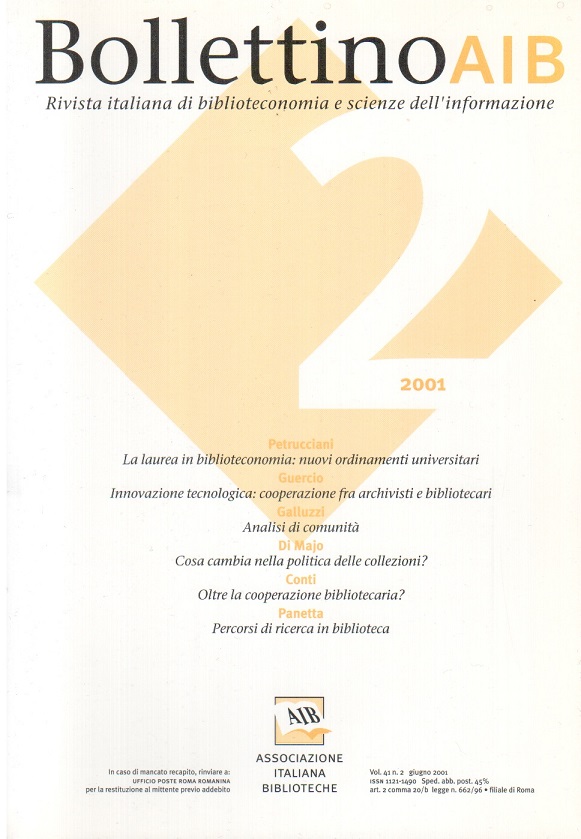A degree in librarianship: aims and prospects of the new university orders
Main Article Content
Abstract
The title of this contribution refers to one of the goals that have always been cherished by Italian librarians: to finally see in Italy the initial professional training of librarians entrusted to a specific course of university studies, on a level with those that have for some time been preparing other intellectual professions (starting from the most acknowledged, the lawyer and the engineer, the architect and the physician).
University training is increasingly conceived today - especially in the more advanced countries - as a formative offer that is also addressed to those who are less young and those who are already employed.
The new orders should facilitate, in my opinion, this function of “ongoing training”, that is important both for filling the gaps that are still widespread and, above all, as a stimulus and instrument for professional functions that are gradually becoming more difficult and of greater responsibility.
Having completed the enacting of new national regulations, in these months the universities are seeing to a reformulation of their organization. It will however be autumn before we can have a complete and definitive picture of the concrete didactic offers, while at the present time we can only reflect on the potential and possible risks that the new organization opens.
The reform under way is much more significant and pervasive than that which went before, which was characterized above all by the rather unfortunate introduction of a shorter course than the traditional degree and one that was alternative to it: the university diploma. The rather laboured introduction, in our field too, of a diploma for workers in the cultural heritage area refers therefore to the reform of 1990.
In the perspective adopted here, the final goal reached by the “long march” of the degree in librarianship is represented rather by the institutive decrees of the degree in the Preservation of Cultural Heritage, with an archivist-librarian specialization, created in 1978-79 and reformed in 1983, and finally extended with the university development plan of 1991-1993 to about ten universities throughout the national territory. The criticism advanced regarding the unfortunate title of the course and part of its contents are well known. However, in my opinion there are undoubtedly three positive elements, indeed elements of historical novelty for our country:
Among the fundamental motivations of the reform is the extension of the principles of autonomy of the universities also to the didactic level: the universities can therefore independently define their didactic offerings.
University training is increasingly conceived today - especially in the more advanced countries - as a formative offer that is also addressed to those who are less young and those who are already employed.
The new orders should facilitate, in my opinion, this function of “ongoing training”, that is important both for filling the gaps that are still widespread and, above all, as a stimulus and instrument for professional functions that are gradually becoming more difficult and of greater responsibility.
Having completed the enacting of new national regulations, in these months the universities are seeing to a reformulation of their organization. It will however be autumn before we can have a complete and definitive picture of the concrete didactic offers, while at the present time we can only reflect on the potential and possible risks that the new organization opens.
The reform under way is much more significant and pervasive than that which went before, which was characterized above all by the rather unfortunate introduction of a shorter course than the traditional degree and one that was alternative to it: the university diploma. The rather laboured introduction, in our field too, of a diploma for workers in the cultural heritage area refers therefore to the reform of 1990.
In the perspective adopted here, the final goal reached by the “long march” of the degree in librarianship is represented rather by the institutive decrees of the degree in the Preservation of Cultural Heritage, with an archivist-librarian specialization, created in 1978-79 and reformed in 1983, and finally extended with the university development plan of 1991-1993 to about ten universities throughout the national territory. The criticism advanced regarding the unfortunate title of the course and part of its contents are well known. However, in my opinion there are undoubtedly three positive elements, indeed elements of historical novelty for our country:
- the establishment for the first time of a specific degree, even if in the partial form of a specialization, but with legal value, in “cohabitation” with the archivist sector within a course formed of three specializations (four since 1991) with paths that are all independent and separate;
- the resulting introduction in the university orders of an extensive range of specialized disciplines, even if often lacking in adequate human resources or with temporary or improvised solutions;
- through the diffusion of these courses, together with the increased activity of different institutions such as the special School for archivists and librarians of Rome and the Vatican School of librarianship, the fundamental change of the work market, in which for the first time in Italian history the majority of those starting work in libraries come from an initial, chosen and completed training process, with the undeniable consequences at the level of motivation and rapidity and effectiveness of insertion.
Among the fundamental motivations of the reform is the extension of the principles of autonomy of the universities also to the didactic level: the universities can therefore independently define their didactic offerings.
Article Details
Section
Articles

This work is licensed under a Creative Commons Attribution-ShareAlike 4.0 International License.
